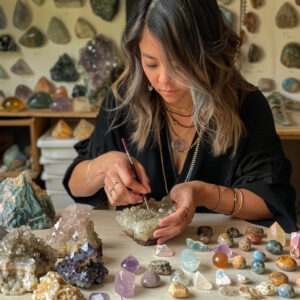Quick Overview
- Its allure extends beyond its visual appeal, as it possesses a remarkable hardness that contributes to its durability and versatility.
- Onyx, a member of the chalcedony family, boasts a Mohs hardness rating of 7, placing it among the harder minerals.
- While onyx is relatively hard, it can still be scratched by materials with a higher Mohs hardness rating, such as diamonds or sapphires.
In the realm of gemstones, onyx stands out with its captivating beauty and enigmatic properties. Its allure extends beyond its visual appeal, as it possesses a remarkable hardness that contributes to its durability and versatility. Delve into the depths of onyx’s hardness, exploring the factors that influence its resilience and uncovering its practical applications in various industries.
Mohs Scale: A Benchmark for Measuring Hardness
The Mohs scale, a universally recognized standard, serves as the cornerstone for quantifying the hardness of minerals. This scale, ranging from 1 to 10, assigns a numerical value to each mineral, with 1 representing the softest and 10 denoting the hardest. Onyx, a member of the chalcedony family, boasts a Mohs hardness rating of 7, placing it among the harder minerals.
Factors Influencing Onyx’s Hardness
The hardness of onyx is attributed to several factors, including its crystalline structure, chemical composition, and impurities. The tightly packed arrangement of silicon dioxide molecules within onyx’s crystal lattice contributes to its resistance to scratching and abrasion. Additionally, the presence of trace elements, such as iron and manganese, further enhances its durability.
Practical Applications of Onyx’s Hardness
Onyx’s exceptional hardness renders it suitable for a wide array of practical applications. Its resistance to wear and tear makes it an ideal material for countertops, flooring, and other architectural elements. Furthermore, onyx’s durability extends its use to jewelry, where it is fashioned into stunning rings, necklaces, and earrings.
Benefits of Onyx’s Hardness in Various Industries
The hardness of onyx translates into numerous benefits across various industries. In the construction sector, onyx’s durability makes it a preferred choice for countertops, tiles, and other surfaces that endure heavy use. Its resistance to scratching and staining ensures longevity and minimal maintenance.
In the jewelry industry, onyx’s hardness enables intricate carving and engraving, allowing artisans to create exquisite designs with exceptional detail. Its durability makes it suitable for everyday wear, ensuring that cherished pieces can be enjoyed for generations.
Comparison of Onyx’s Hardness with Other Gemstones
To provide context, let’s compare onyx’s hardness with other popular gemstones. Diamond, the hardest known natural material, sits at the pinnacle of the Mohs scale with a rating of 10. Ruby and sapphire, both members of the corundum family, follow closely with a hardness of 9. Emerald, renowned for its captivating green hue, ranks at 7.5 to 8 on the Mohs scale, slightly harder than onyx.
Preserving Onyx’s Hardness: Care and Maintenance
To maintain the hardness and beauty of onyx, proper care and maintenance are essential. Regular cleaning with a mild detergent and water, followed by thorough drying, helps prevent dirt and grime accumulation. Avoid exposing onyx to harsh chemicals or extreme temperatures, as these factors can compromise its integrity.
Answers to Your Questions
1. Q: Can onyx be scratched?
A: While onyx is relatively hard, it can still be scratched by materials with a higher Mohs hardness rating, such as diamonds or sapphires.
2. Q: How can I tell if onyx is real?
A: Genuine onyx typically exhibits a banded appearance with alternating light and dark layers. It is also heavier than plastic or glass imitations.
3. Q: Is onyx suitable for everyday wear in jewelry?
A: Yes, onyx’s hardness makes it durable enough for everyday wear. However, it is advisable to remove onyx jewelry during strenuous activities to minimize the risk of scratches or damage.
4. Q: How can I clean onyx jewelry?
A: Use a mild detergent and warm water to gently clean onyx jewelry. Avoid harsh chemicals or ultrasonic cleaners, as these can damage the stone.
5. Q: Can onyx be used in outdoor applications?
A: Onyx can be used outdoors, but it is susceptible to weathering and discoloration over time. Proper sealing and protection are necessary to ensure its longevity in outdoor settings.
